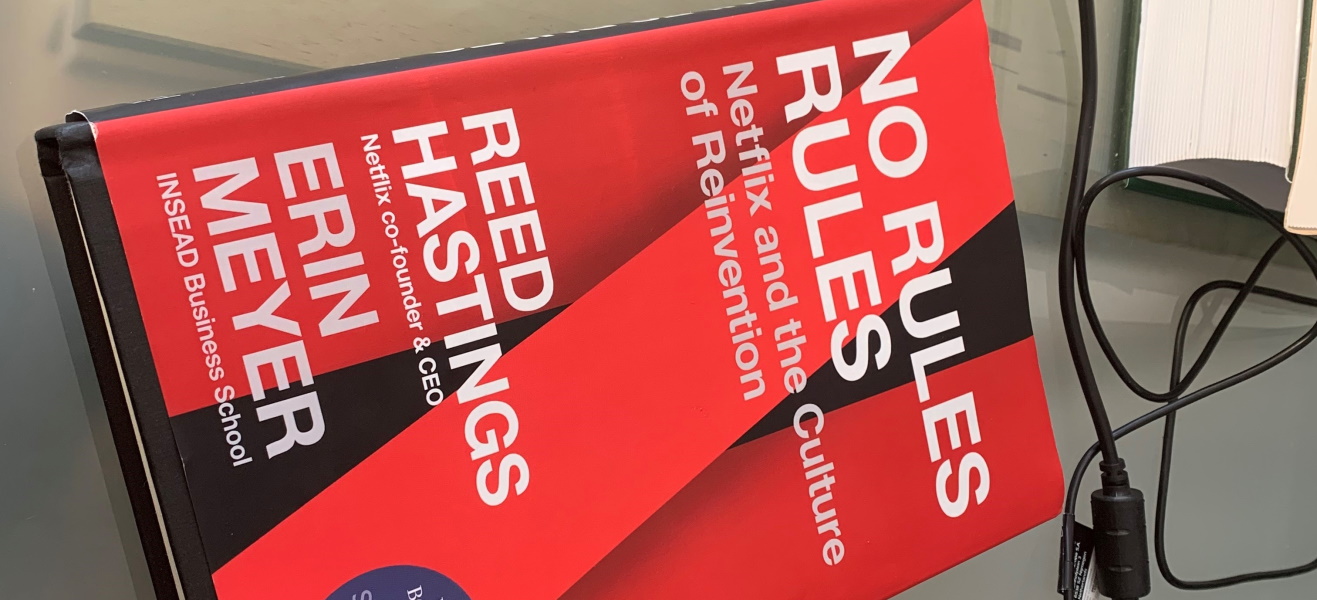I really liked this book. I'd say it is easily in my top favourite books (which probably needs updating). It was recommended to my by my colleague Tom Walters who is a prolific reader.
The book is an account of how Netflix and its leadership have crafted their famous unique culture, specifically how they met and overcame challenges in the early days of their business.
As you progress through the chapters it becomes clear that Reed Hastings and his team wanted to differentiate themselves from other tech companies and attract and hire the best talent but more importantly get the best out of the talent they brought on board and maintain a high bar of quality and performance amongst their employees.
Below are some of the takeaways from the book.
Increase Talent Density
One of the first things Netflix knew they needed to do to become a competitive world leading business was hire and retain the best people and one way they did this was pay top market rates. The book mentions specific cases where they offered people 3x their current salary or bought their house to help them relocate. As well as paying top market rates, they acknowledged that their talented staff will also be desirable to other businesses whom would try and poach them away. So as part of their candor and openness, they encourage employees to let their line managers know whether they have been approached by other companies, how much they have been offered, and even encourage them to attend interviews to find out.
Netflix want their employees to be aware of their own market value and let them know if their market value changes so that they can meet those market rates to keep their talented people as it is a lot cheaper and desirable to keep talent than to replace it.
But as you'd imagine, with paying top market salaries, come expectations of high performance and deliverables from their employees, and if people aren't excelling, Netflix are quick to let them go and make room for other talented replacements.
As Netflix don't want their business to be like a family, they want it to be like a sports team.
Sports teams have one goal, to get better and beat their competition. They do this by constantly reviewing whether they have the best people in various positions. And if they need to make changes to make their team stronger, they will.
Part of tools managers employ at Netflix (and other places) is the Keeper Test. And they are encouraged to use this regularly. What is the Keeper Test?
If an employee wanted to leave, how hard would the manager fight to keep them? If not at all, then they should probably let them go right away and replace them with a better talented person. If they'd be upset to loose a person, then they are a keeper and should be treated as such.
Increase Candor
The Netflix culture is perhaps best known for the Radical Honesty that they encourage throughout the business. The belief being, that if everyone tells each other how to be better, guess what.. people will get better. Though giving and receiving feedback is a skill, which is why Netflix staff receive training on how best to give and receive feedback.
One way that employees are encouraged to increase candor is to talk about their mistakes. The benefits of this are many when you think about it. Firstly inter personal connections increase when we perceive vulnerability, humility and honesty in others, secondly it is an opportunity for the individual to learn and grow from their mistake and thirdly it is an opportunity for other people to learn from the mistakes of others.
Making mistakes is a part of the culture at Netflix as people are encouraged to take risks and make bets as it is only by taking calculated risks that progress is made especially when not all the answers are known up front. Mistakes are opportunities to learn.
Freedom and Responsibility
Another factor that is synonymous with the Netflix culture is their promotion of Freedom and Responsibility. Because Netflix hire the best people, they are able to remove many of the controls usually associated with decision making and rely upon the skills and experience of their staff to make good decisions.
Therefore employees at Netflix are given (compared to other organisations) a large amount of freedom with regards to how they operate and make decisions. The only caveat being that with that freedom comes an accompanying amount of responsibility with those decisions that are theirs to make.
It is for this reason that managers are encouraged to trust their team. After all what is the point in hiring the best people if they aren't allowed to follow their own judgement?
The analogy of Making bets is used in this context. Employees are encouraged to pursue an activity, even if they think it is somewhat risky, if the reward is sufficient, however the bet must be made with both eyes open. Not all bets are going to succeed, but the bets of talented employees are more likely to pay off than those of others, and guess what, if you consistently make bad bets, you probably wont be on the team for very long.
Remove Controls
With such a high level of trust in their highly talented and performing workforce, Netflix started to experiment with what controls they could remove to allow an even greater degree of freedom.
This led to them removing the annual leave policy. Instead of having a quota of x amount of days per year, making people request time off and tracking how many days people had requested/remaining, Netflix did something interesting. They allowed people to take as much time off as they wanted. This meant that if someone wanted to take a month off somewhere, so long as it didn't disadvantage their department, they could do that.
Other policies that were removed include the expense and travel policies, streamlining employees abilities to get their work done. The book included examples of the absence of such policies allowed its staff to make quick decisions to get the business out of sticky situations, which they otherwise wouldn't have been able to do with policies in place.
The underlying mindset that people were asked to think about instead of there being the expected rules to follow was "Is this in the best interest of the company". Simple but effective.
But some people struggled with the absence of rules.
Context over Control
Netflix found early on that the absence of rules brought it's own problems that they had to overcome.
Firstly, if people took too many liberties, they fired them and publicly talked about why people were fired. Netflix made sure to be open an honest about why people were let go.
Secondly, they found that without rules, people stopped taking holiday. They mistook the 'holiday no policy' for a 'no holiday policy'. Netflix knew that they needed their staff to take holidays and noticed that even their leadership were taking less holiday than they'd like. So to combat this they strongly encouraged their leadership to take a lot of annual leave, thereby showing how they expected everyone to behave by using the leadership as examples and providing context.
Differences in Cultures when Growing Internationally
Designing and implementing a culture is all well and good but Netflix found cultural differences when they expanded internationally. They found that certain cultures were more or less comfortable with speaking openly with candor, giving their boss feedback or taking risks. The closing chapter in this book discusses some of the nuances and differences in different cultures and how they addressed some of these challenges.
Summary
I like books like these that take a 'warts and all' approach to story telling, with many examples of context that talk about real people in real scenarios. There are so many take aways from this book. Specifically the importance of culture and alignment. I suggest you give it a read or at least add it to your reading list.
-- Lee
















